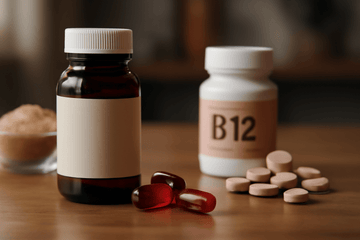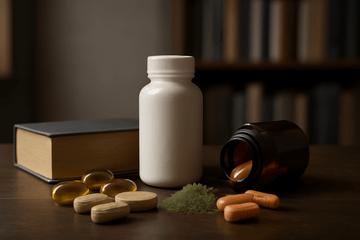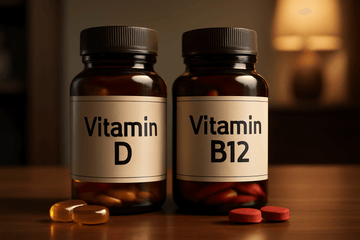Many types of vitamins stand out for their widespread impact on our health. Among these essential nutrients, Vitamin B12, also known as cobalamin, plays a significant role in many bodily functions. It also helps in keeping us energetic and well. When it comes to buying these essential vitamins, numerous options are available on pharmacy shelves and online stores. We understand that it can get extremely overwhelming to decide which one to buy.
From different forms and dosages to various methods of taking this supplement, selecting the best option can feel like a daunting task. So, here’s an easy guide for you to know what to look for when choosing a high-quality B12 supplement that meets your nutritional deficiencies.
What are the Benefits of Vitamin B12?
Vitamin B12 works as a significant source of nutrients involved in some of the most fundamental processes in your body. Understanding the benefits of these vitamins helps in recognising why maintaining adequate levels is crucial for everyone.
Helps in the Energy Production
While Vitamin B12 does not directly provide energy, it plays a critical role in the metabolic pathways that convert the food you eat, including carbohydrates, fats, and proteins, into usable energy. It acts as a coenzyme in these processes.
Without sufficient B12, your body struggles to convert fuel into energy efficiently, which can leave you feeling unusually tired, sluggish, and lacking vitality. It helps your cells work efficiently, ensuring that every bite you eat contributes effectively to your energy levels throughout the day.
Red Blood Cell Formation
One of the most well-known functions is the significant role in the production of healthy red blood cells. Red blood cells are responsible for carrying oxygen from your lungs to every part of your body.
When B12 levels are low, your body cannot produce enough healthy red blood cells. And even if your body makes red blood cells, they are not in proper shape and do not function properly. This condition is known as megaloblastic anaemia, which can lead to severe tiredness, weakness, and shortness of breath. Adequate B12 ensures that your blood can effectively deliver the oxygen necessary for all your tissues and organs to function correctly.
Keep your Nervous System Healthy
One of the most significant contributions of vitamin B12 is to maintain a healthy nervous system. It is vital for the formation and maintenance of myelin. It is a fatty substance that surrounds your nerve fibres, which allows nerve signals to travel quickly throughout your body.
With insufficient B12 levels, myelin can be damaged, leading to a range of neurological symptoms. These can include tingling or numbness in the hands and feet, balance problems, difficulty walking, muscle weakness, and more serious issues if left untreated for an extended period. A well-functioning nervous system relies heavily on a steady supply of this vital vitamin from iCare Naturals.
Essential for DNA Synthesis
Vitamin B12 is also necessary for the synthesis of DNA, which is found in all your cells. DNA is the blueprint that guides cell growth, repair, and reproduction.
Every time your body creates new cells, whether it is for healing a wound, growing hair, or replacing old blood cells, B12 is involved in ensuring that the DNA is correctly made. This demonstrates the significance of these vitamins for overall cellular health and the functioning of nearly every organ in your body.
How Much Vitamin B12 Do You Need?
Sometimes, it can be unclear to determine the exact amount of Vitamin B12 that your body needs to function correctly. It happens because supplement dosages usually look very high compared to daily recommendations. So, if you are also concerned about the recommended daily dosage for this supplement, here's what you need to know:
Recommended Daily Allowance
The official recommended daily allowance (RDA) for Vitamin B12 for most healthy adults is relatively small:
- Adults (19 years and older): 2.4 micrograms (µg) per day.
- Pregnant women: 2.6 µg per day.
- Breastfeeding women: 2.8 µg per day.
- Children and adolescents: The RDA varies by age, ranging from 0.4 µg for infants between 0 and 6 months to 1.2 µg for children up to 8 years.
Choosing the Best Form of Vitamin B12 Supplement
With a variety of B12 supplements available in stores, choosing the best ones involves understanding the different forms of B12, the most effective ways to take it, and other essential factors, such as the quality of the product and the results or reviews from clients.
Forms of Vitamin B12
This is the most important decision when selecting a B12 supplement. There are several forms of cobalamin available on the market. However, not all are equally well absorbed by the body. Therefore, the best decision you can make for yourself is to determine which form of B12 supplements works best for you, and then you can place an order without wasting another minute.
Methylcobalamin
This is one of the active coenzyme forms of B12. It is found naturally in food and is directly absorbed by your cells without requiring conversion. Methylcobalamin is particularly important for neurological health, as it plays a crucial role in methylation, a vital process involved in DNA repair, detoxification, and mood regulation. Many experts and individuals prefer this form due to its direct bioavailability and safety. It is highly effective for many individuals who want to focus on maintaining a healthy nervous system.
Adenosylcobalamin
This is another active coenzyme form of B12 and is considered a significant partner of methylcobalamin. It is vital for energy metabolism, as it works in the mitochondria, which are the "powerhouses" of your cells. Usually, Methylcobalamin and Adenosylcobalamin are combined in supplements to provide comprehensive B12 support for both neurological function and energy production.
Hydroxocobalamin
This is a naturally occurring form of B12 that is also readily converted into the active forms methylcobalamin and adenosylcobalamin in the body. It is often preferred in B12 injections due to its slower release and excellent retention in the body. It is also known to have additional benefits for the detoxification of cyanide, which is a dangerous toxin disrupting cellular respiration, leading to cellular hypoxia and death.
Cyanocobalamin
This is the most common, cheapest, and most stable form of B12 found in many supplements and foods. Your body converts cyanocobalamin into the active forms, methylcobalamin and adenosylcobalamin before it can be used. This conversion process can be less efficient for individuals with kidney problems. While generally effective for many, the active forms are often recommended for better absorption of B12 supplements.
Conclusion
Vitamin B12 is an essential nutrient vital for energy, blood health, and the proper functioning of the nervous system. It helps keep you healthy overall. While many people obtain sufficient B12 from their diet, some individuals may have nutritional deficiencies, be elderly, or experience digestive issues. They usually benefit from taking B12 supplements.
There is no single best vitamin B12 supplement for everyone, as the ideal choice depends on your individual health needs, dietary habits, and any absorption challenges you might face. However, by prioritising supplements containing methylcobalamin or a combination of methylcobalamin and adenosylcobalamin for their active and bioavailable forms and always opting for high-quality products from reputable brands like ours, you can make a more informed decision. However, always remember to consult your doctor before starting any supplement so that they can guide you more effectively. Take these tablets consistently for optimal results.





